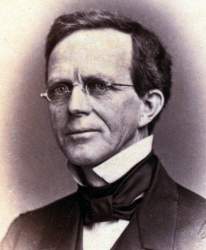Record Data
Source citation
William A. Barnes, History of the Thirty-Ninth Congress of the United States (New York: Harper and Brothers, 1868), 190-192.
Type
Speech
Date Certainty
Exact
Transcription date
Transcription
The following text is presented here in complete form, as it originally appeared in print. Spelling and typographical errors have been preserved as in the original.
I regard the bill to which the attention of the Senate is now called, as the most important measure that has been under its consideration since the adoption of the constitutional amendment abolishing slavery. That amendment declared that all persons in the United States should be free. This measure is intended to give effect to that declaration, and secure to all persons within the United States practical freedom. There is very little importance in the general declaration of abstract truths and principles unless they can be carried into effect, unless the persons who are to be affected by them have some means of availing themselves of their benefits. Of what avail was the immortal declaration "that all men are created equal; that they are endowed by their Creator with certain inalienable rights; that among these are life, liberty, and the pursuit of happiness" and "that to secure these rights governments are instituted among men" to the millions of the African race in this country who were ground down and degraded, and subjected to a slavery more intolerable and cruel than the world ever before knew? Of what avail was it to the citizen of Massachusetts, who, a few years ago, went to South Carolina to enforce a constitutional right in court, that the Constitution of the United States declared that the citizens of each State shall be entitled to all the privileges and immunities of citizens in the several States? And of what avail will it now be that the Constitution of the United States has declared that slavery shall not exist, if in the late slaveholding States laws are to be enacted and enforced depriving persons of African descent of privileges which are essential to freemen ?
It is the intention of this bill to secure those rights. The laws in the slaveholding States have made a distinction against persons of African descent on account of their color, whether free or slave. I have before me the statutes of Mississippi. They provide that if any colored person, any free negro or mulatto, shall come into that State for the purpose of residing there, he shall be sold into slavery for life. If any person of African descent residing in that State travels from one county to another without having a pass or a certificate of his t freedom, he is liable to be committed to jail, and to be dealt with as a person who is in the State without authority. Other provisions of the statute prohibit any negro or mulatto from having fire-arms; and one provision of the statute declares that for :exercising the functions of a minister of the Gospel, free negroes and mulattoes, on conviction, may be punished by any number of lashes not exceeding thirty-nine, on the bare back, and shall pay the costs." Other provisions of the statute of Mississippi prohibit a free negro or mulatto from keeping a house of entertainment, and subject him to trial before two justices of the peace and five slaveholders for violating the provisions of this law. The statutes of South Carolina make it a highly penal offense for any person, white or colored, to teach slaves; and similar provisions are to be found running through all the statutes of the late slaveholding States.
When the constitutional amendment was adopted and slavery abolished, all these statutes became null and void, because they were all passed in aid of slavery, for the purpose of maintaining and supporting it. Since the abolition of slavery, the Legislatures which have assembled in the insurrectionary States have passed laws relating to the freedmen, and in nearly all the States they have discriminated against them. They deny them certain rights, subject them to severe penalties, and still impose upon them the very restrictions which were imposed upon them in con sequence of the existence of slavery, and before it was abolished. The purpose of the bill under consideration is to destroy all these discriminations, and to carry into effect the constitutional amendment.....
Most of the provisions of this bill are copied from the late Fugitive Slave Act, adopted in 1850 for the purpose of returning fugitives from slavery into slavery again. The act that was passed at that time for the purpose of punishing persons who should aid negroes to escape to freedom is now to be applied by the provisions of this bill to the punishment of those who shall undertake to keep them in slavery. Surely we have the authority to enact a law as efficient in the interests of freedom, now that freedom prevails throughout the country, as we had in the interest of slavery when it prevailed in a portion of the country.
Footnotes
Note: Sections of description of the bill omitted.


